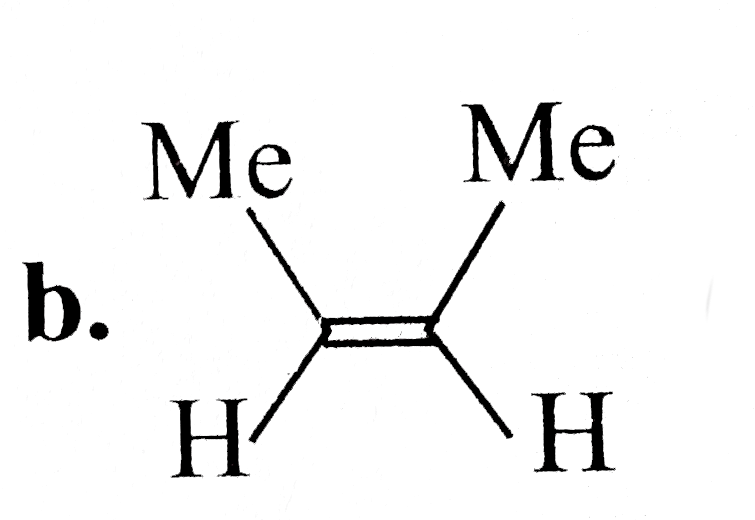Which of the following compounds do(es) not react with H2+Pd+C?
a.Me−≡−Me
b.
c.MeCOMe
d.Me−N3
The correct Answer is:B, C
To determine which of the following compounds does not react with H2+Pd+C, we need to analyze the nature of the compounds and the reaction conditions. The compounds in question are likely to include different types of functional groups, such as alkynes, alkenes, azides, and ketones.
1. Understanding the Reaction:
- The combination of H2, palladium (Pd), and carbon (C) is commonly used in catalytic hydrogenation reactions. This process typically reduces multiple types of unsaturated compounds, including alkynes (triple bonds), alkenes (double bonds), and some azides.
2. Analyzing Each Compound:
- Option A: Alkyne (e.g., MeC≡CMe)
- Alkynes can be reduced to alkenes and then to alkanes. When treated with H2+Pd+C, the triple bond will first convert to a double bond and then to a single bond upon further hydrogenation.
- Conclusion: This compound will react.
- Option B: Alkene (e.g., MeCH=CHMe)
- Alkenes can also be reduced to alkanes. The double bond will break, and hydrogen will be added across the double bond.
- Conclusion: This compound will react.
- Option C: Azide (e.g., MeN3)
- Azides can be reduced to amines. The nitrogen-nitrogen bonds can be broken, and hydrogen can be added to form an amine.
- Conclusion: This compound will react.
- Option D: Ketone (e.g., MeC(=O)Me)
- Ketones are generally more stable and require stronger reducing agents to convert to alcohols. The reaction with H2+Pd+C is not favorable because the carbon-oxygen double bond is stable and does not easily undergo reduction without a stronger nucleophile.
- Conclusion: This compound will NOT react.
3. Final Answer:
- The compound that does not react with H2+Pd+C is Option C: Ketone (MeC(=O)Me).
- The combination of H2, palladium (Pd), and carbon (C) is commonly used in catalytic hydrogenation reactions. This process typically reduces multiple types of unsaturated compounds, including alkynes (triple bonds), alkenes (double bonds), and some azides.
- Option A: Alkyne (e.g., MeC≡CMe)
- Alkynes can be reduced to alkenes and then to alkanes. When treated with H2+Pd+C, the triple bond will first convert to a double bond and then to a single bond upon further hydrogenation.
- Conclusion: This compound will react.
- Alkenes can also be reduced to alkanes. The double bond will break, and hydrogen will be added across the double bond.
- Conclusion: This compound will react.
- Azides can be reduced to amines. The nitrogen-nitrogen bonds can be broken, and hydrogen can be added to form an amine.
- Conclusion: This compound will react.
- Ketones are generally more stable and require stronger reducing agents to convert to alcohols. The reaction with H2+Pd+C is not favorable because the carbon-oxygen double bond is stable and does not easily undergo reduction without a stronger nucleophile.
- Conclusion: This compound will NOT react.
- The compound that does not react with H2+Pd+C is Option C: Ketone (MeC(=O)Me).
Topper's Solved these Questions
- REDUCTION AND OXIDATION REACTION OF ORGANIC COMPOUNDSBOOK - CENGAGE CHEMISTRY ENGLISHCHAPTER - REDUCTION AND OXIDATION REACTION OF ORGANIC COMPOUNDSEXERCISE - Exercise (Single Correct)
90 Videos
- REDUCTION AND OXIDATION REACTION OF ORGANIC COMPOUNDSBOOK - CENGAGE CHEMISTRY ENGLISHCHAPTER - REDUCTION AND OXIDATION REACTION OF ORGANIC COMPOUNDSEXERCISE - Exercise (Assertion And Reasoning)
10 Videos
- REDUCTION AND OXIDATION REACTION OF ORGANIC COMPOUNDSBOOK - CENGAGE CHEMISTRY ENGLISHCHAPTER - REDUCTION AND OXIDATION REACTION OF ORGANIC COMPOUNDSEXERCISE - Exercise (Linked Comprehension)
52 Videos
- QUALITATIVE INORGANIC SALT ANALYSISBOOK - CENGAGE CHEMISTRY ENGLISHCHAPTER - QUALITATIVE INORGANIC SALT ANALYSISEXERCISE - Viva Voce Questions And Part-C (Analysis Of Cations)
42 Videos
- SOLID STATEBOOK - CENGAGE CHEMISTRY ENGLISHCHAPTER - SOLID STATEEXERCISE - Ex 1.2 (Objective)
9 Videos
Similar Questions
Knowledge Check
Which of the following compounds does not react with NaOH ?
ACH3COOHBCH3CONH2CC6H5OHDCH3CH2OHWhich of the following compounds does not react with NaHCO3?
ACH3COOHBCH3CONH2CC6H5OHDCH3CH2OHWhich of the following compounds does not react with NaHSO3 ?
ACH3COOHBCH3CONH2CC6H5OHDCH3CH2OH
Which of the following compounds reacts with NaCNBH3?
View SolutionWhich of the following compound react with B2H6?
View SolutionWhich of the following compound does not react with Tollen's reagent?
View SolutionWhich of the following compounds will react with NaNH2 ?
View SolutionWhich of the following compounds react with HNO2?
View Solution
